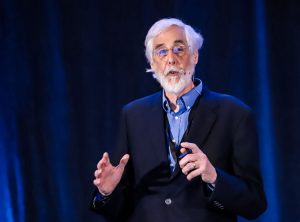This article is part of an extensive feature on the 2024 HAEi Regional Conference Americas, published in Global Perspectives #1 2024
HAE: 10 Things Patients Need to Know
 Taking on the challenge of following powerful, personal stories was world-renowned Prof. Bruce Zuraw. Introduced by Tony Castaldo as an ‘accomplished physician and researcher who always keeps the voice of our community in mind,’ Prof. Zuraw took to the stage.
Taking on the challenge of following powerful, personal stories was world-renowned Prof. Bruce Zuraw. Introduced by Tony Castaldo as an ‘accomplished physician and researcher who always keeps the voice of our community in mind,’ Prof. Zuraw took to the stage.
Prof. Zuraw talks about the 10 things he felt all HAE patients need to know. He told the audience that over 40 years ago, when he started treating HAE, he couldn’t have imagined the progress that would be made. That progress has to translate into better care for everyone with the disease.
Prof. Zuraw framed his 10 things around 10 questions: Why me? How will HAE affect me? What about my family? What causes attacks of HAE? Can I treat attacks? Can I prevent attacks? How do I find the right doctor? Who can I turn to for help? Can I dream about a cure? What can I do to make that dream a reality?
As an essential talk, we wanted all participants at each of our Regional Conferences to hear Prof. Zuraw. You can read more about his talks from the 2023 Regional Conference APAC and 2023 Regional Conference EMEA.
We share a few points specific to the Americas and Prof. Zuraw’s incredibly inspiring conclusion before bringing you a new interview.
How do we treat attacks?
Prof. Zuraw told the audience that while we don’t all live in countries with all the modern rescue medicines, that is what we’re fighting for.
If you can get one of the first-line rescue medicines (two forms of C1-inhibitor and icatibant), these are proven to be effective. Fresh frozen plasma or solvent-detergent treated plasma can be used in an emergency. It has C1-inhibitor in it, but it has certain risks.
All patients with HAE should have one of the modern rescue medicines available, ideally two doses. You don’t know if you’ll need a second dose or if you’ll have another attack before you can get it renewed. Prof. Zuraw reiterated that all attacks are eligible for treatment, and you should treat them as soon as possible. “Antihistamines, steroids, and epinephrine are not going to work. Don’t let doctors in emergency rooms try to convince you otherwise,” he said.
Can I prevent attacks?
Prof. Zuraw stated that patients really want a normal life. Right now, in the United States, he said, we have four approved long-term modern prophylactic medications: two different forms of C1-inhibitor (IV and subcutaneous injection) and two different medications that target plasma kallikrein.
Androgens are second-line. If you can avoid taking androgens, that’s good. If you have no other alternative, you need to use what you have.
Prof. Zuraw told the audience that treatment must be individualized, “use your critical voice, and don’t let the decision be made by a doctor only, as they don’t live your life.”
In concluding, Prof. Zuraw told the audience that his personal dream is that all patients with HAE will be able to live an entirely normal life. He said that this future will depend on you. He asked all those present to believe and to pursue it.
Find more feature articles from the 2024 HAEi Regional Conference Americas:










